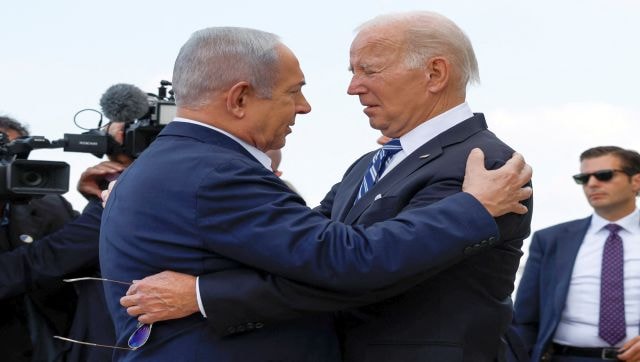POTUS is home. The president of the United States, Joe Biden, is back in Washington after his eight-hour visit to Israel during which he reaffirmed his country’s support to the conflict-ridden nation. In his meeting with Israel’s Benjamin Netanyahu, the US president expressed his solidarity with Jerusalem against their fight with Hamas and also batted for the two-state solution. “We are measured by the power of our example, and that’s why as hard as it is, we must keep pursuing peace,” he said after his meeting with Netanyahu. “We must keep pursuing a path so that Israel and the Palestinian people can both live safely and securely in dignity and in peace “For me, that means a two-state solution, the US president said. In his remarks during which he also announced $100 million for humanitarian aid in the war-torn Gaza and the West Bank, Biden said that the recent attacks had made him even more determined in his efforts to push for a two-state solution. “We must keep working for Israel’s greater integration with its neighbours. These attacks have only strengthened my commitment and determination and my will to get that done,” he added. Biden is not alone in his push for the two-state solution. As the war continues to extract a heavy death toll, many leaders across the world have affirmed their support to the two-state solution. But what exactly is this two-state solution? Will it help resolve the years-long conflict between Israel and Palestine? Who has expressed support for it? [caption id=“attachment_13269282” align=“alignnone” width=“640”] US president Joe Biden with Israeli prime minster Benjamin Netanyahu, as he visited Israel amid the ongoing conflict between Israel and Hamas. Biden in his meeting with the Israeli leader spoke of the two-state solution and why it was time that it be implemented. Reuters[/caption] What is the two-state solution? The two-state solution is born out of the
years-long conflict between Israel and Palestine
, and at the most basic level it is about how or whether to divide territory between the two peoples – the Jews and the Arabs. What the two-state solution proposes is establishing two states for two peoples: Israel for the Jewish people and Palestine for the Palestinian people. As the New York Times reports, this, in theory, would win Israel security and allow it to retain a Jewish demographic majority (letting the country remain Jewish and democratic) while granting the Palestinians a state. According to The Print, the genesis of the modern two-state solution lies with the Camp David Accords, a treaty of peace signed between Egypt and Israel in 1978. It was in 1988 that the Palestinian Liberation Organisation (PLO) recognised the right of Israel to exist, which indicated its willingness to a two-state solution. It was between 1993 and 1995 through the Oslo Accords I and II that Palestinians recognised the State of Israel and Israel recognised its historical enemy, the PLO, as the sole representative of the Palestinian people. A self-governing Palestinian Authority was set up. However, in the subsequent years, negotiations failed and
Hamas
, who is in control of the Gaza Strip since 2007, rejected the two-state solution till at least 2017. [caption id=“attachment_13269262” align=“alignnone” width=“640”]
US president Joe Biden with Israeli prime minster Benjamin Netanyahu, as he visited Israel amid the ongoing conflict between Israel and Hamas. Biden in his meeting with the Israeli leader spoke of the two-state solution and why it was time that it be implemented. Reuters[/caption] What is the two-state solution? The two-state solution is born out of the
years-long conflict between Israel and Palestine
, and at the most basic level it is about how or whether to divide territory between the two peoples – the Jews and the Arabs. What the two-state solution proposes is establishing two states for two peoples: Israel for the Jewish people and Palestine for the Palestinian people. As the New York Times reports, this, in theory, would win Israel security and allow it to retain a Jewish demographic majority (letting the country remain Jewish and democratic) while granting the Palestinians a state. According to The Print, the genesis of the modern two-state solution lies with the Camp David Accords, a treaty of peace signed between Egypt and Israel in 1978. It was in 1988 that the Palestinian Liberation Organisation (PLO) recognised the right of Israel to exist, which indicated its willingness to a two-state solution. It was between 1993 and 1995 through the Oslo Accords I and II that Palestinians recognised the State of Israel and Israel recognised its historical enemy, the PLO, as the sole representative of the Palestinian people. A self-governing Palestinian Authority was set up. However, in the subsequent years, negotiations failed and
Hamas
, who is in control of the Gaza Strip since 2007, rejected the two-state solution till at least 2017. [caption id=“attachment_13269262” align=“alignnone” width=“640”] People take part in a pro-Palestinian rally in Sydney. A growing number of people are calling for Israel and Palestine to talk and settle on the two-state solution. Reuters[/caption] Why hasn’t the two-state solution been implemented? Though simplistic in nature, there have been demands from both sides that have made the implementation of the two-state solution nearly impossible. The first hurdle is the matter of borders. Israel has constructed barriers along and within the West Bank as well as built settlements in the West Bank. This makes it difficult to establish that land as part of an independent Palestine. Another problem in the two-state solution is Jerusalem. Both sides claim the ancient city as their capital. This is because of its huge historical and religious significance for both Israelis and Palestinians and the fact it is home to several holy sites in Judaism, Islam and Christianity.
People take part in a pro-Palestinian rally in Sydney. A growing number of people are calling for Israel and Palestine to talk and settle on the two-state solution. Reuters[/caption] Why hasn’t the two-state solution been implemented? Though simplistic in nature, there have been demands from both sides that have made the implementation of the two-state solution nearly impossible. The first hurdle is the matter of borders. Israel has constructed barriers along and within the West Bank as well as built settlements in the West Bank. This makes it difficult to establish that land as part of an independent Palestine. Another problem in the two-state solution is Jerusalem. Both sides claim the ancient city as their capital. This is because of its huge historical and religious significance for both Israelis and Palestinians and the fact it is home to several holy sites in Judaism, Islam and Christianity.
Israel vs Hamas war: Related coverage Hamas, Hezbollah & Intifada: A guide to understanding the glossary of Israel-Palestine conflict Israel-Hamas war: A look at antisemitism, anti-Zionism amid rising hate crimes in West Amid the Israel-Hamas war, how Benjamin Netanyahu is losing the battle at home Israel-Hamas war: Why France is seeing a big fallout from conflict Hamas vs Hezbollah: Differences and similarities, explained Who can broker peace between Israel, Hamas? Can India help? Can Israel permanently dismantle Hamas by invading Gaza?
Israel claims Jerusalem is their “undivided capital”, and it is the seat of the Israeli government and parliament (Knesset). However, the eastern part of Jerusalem is widely recognised as Palestinian territory. Apart from the issue of demarcation of land, is the issue of refugees. Almost five million Palestinians who were forced from their homes in today’s Israel wish to return. However, this is unacceptable by Israel, who argues that the demographics of the country would be affected by the influx of people. Security concerns are also central to Israel as it’s constantly harassed by terrorist groups such as Hamas that controls Gaza Strip. Hamas and other Islamist groups in Gaza launch rockets into Israel time-to-time. Moreover, there are also concerns of Palestinian attacks inside Israel. Who supports the two-state solution? Even though Israel and Palestine both support this solution in theory, conditions laid down by them make it difficult for its implementation. For instance, Israel demands that the Palestinian side demilitarises – as it sees Hamas and other militant groups, as an existential threat. Fatah and the governing Palestinian Authority in the West Bank support the solution, providing they are allowed to police themselves. Other countries have also affirmed their support to the two-state solution. Joe Biden had last year also said that the two-state solution is the best way to achieve “lasting negotiated peace between the State of Israel and the Palestinian people”. Apart from the US, countries such as China, Germany and other Western nations have also batted for the solution. India, too, expresses support for the two-state solution with Ministry of External Affairs spokesperson Arindam Bagchi recent saying that India advocated the resumption of direct negotiations for a peaceful resolution between the two states.
On 12 October, the MEA statement had read: “Our policy in this regard has been long-standing and consistent. India has always advocated the resumption of direct negotiations towards establishing a sovereign, independent, and viable State of Palestine living within secure and recognized borders, side by side at peace with Israel.” And as Israel declared war on Hamas, the Arab nations also urged for talks on the two-state solution. On 11 October, at an emergency meeting of the Arab League in Cairo, Arab foreign ministers underlined “the importance of resuming the peace process and starting serious negotiations between the PLO and Israel”. Notably, public sentiment among members of the public in both Israel and Palestinian-controlled areas has been moving away from the idea of creating a two-state solution for the region. Public surveys carried out in Israel, Gaza, and the West Bank have revealed that only one in three people now see the feasibility of a political resolution to the issue. According to the Pew Research Center’s survey, a growing number of Israelis are beginning to doubt the feasibility of a two-state solution, with only 35 per cent of respondents believing that a peaceful coexistence between Israel and Palestine can be achieved. This is 15 per cent down from a decade ago and the lowest it has ever been. If not two-state solution, is there another way? But the two-state solution isn’t the only option. However, these are more drastic with other governments considering the two-state solution unacceptable. One version is to have one state in which all would be granted equal rights and the state would be neither Jewish nor Palestinian in character. However, many fear this would risk internal instability or even a return to war. Another option, advocated by a few on the Israeli far right, is to establish one state but preserve Israel’s Jewish character by denying full rights to Palestinians. Under this version, Israel would no longer be a democratic state. With inputs from agencies
)